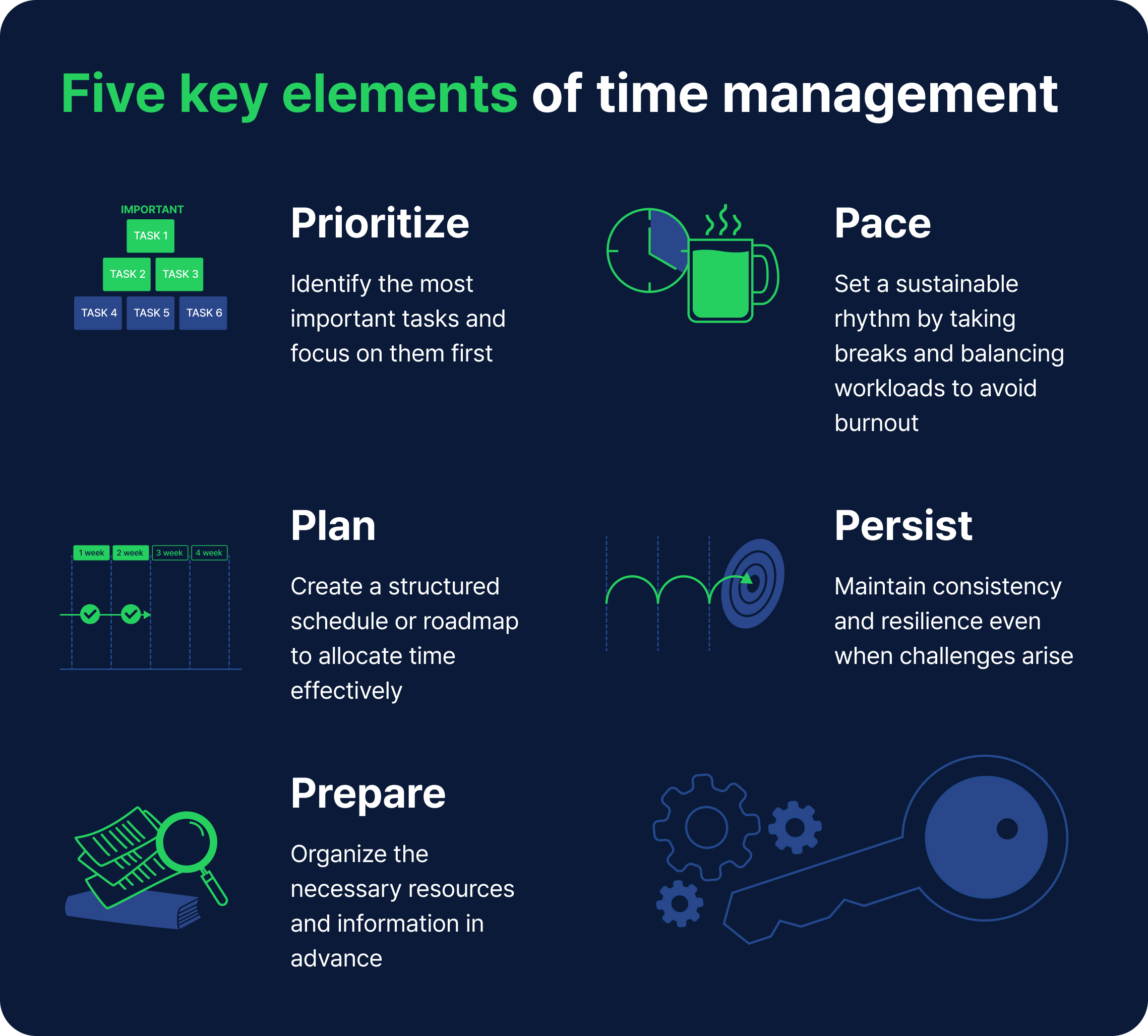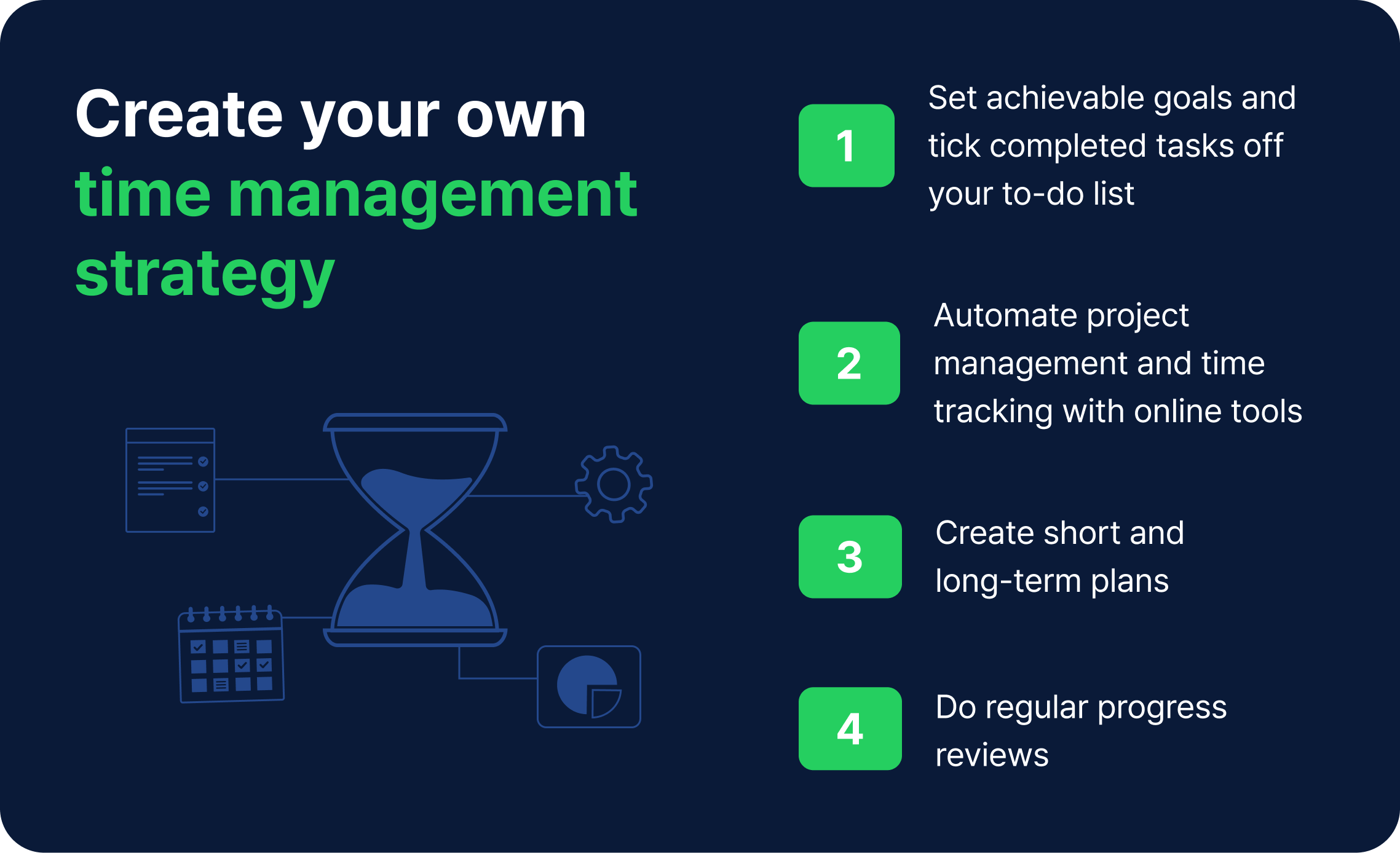What Is Time Management? Mastering the Essential Skills
-
Ola Rybacka
- October 16, 2024
- 8 min read

What is time management? It is the process of planning, organizing, and intentionally controlling how much time is allocated to specific activities to maximize productivity and efficiency. It involves setting priorities, establishing goals, and strategically using the time to achieve goals and objectives within a designated period.
How does mastering time management skills help you work smarter and tick off the items from a to-do list more efficiently? A glance at practical knowledge and a bunch of useful yet simple time management tips should do the job here 🫡
Understanding what is time management
You already know that time management is planning and controlling how much time to spend on specific tasks to increase efficiency and productivity. However, putting this basic info into practice takes more energy and self-control and often makes people lose enthusiasm even before achieving any noticeable results.
Here comes the game-changer: establish a routine by following the steps of a prepared in-advance improvement plan to stay focused on pursuing your goal.
Squeeze more from your worktime with TimeCamp
What are the five key elements of time management?
The five key principles of time management—prioritize, plan, prepare, pace, and persist—work together to create an effective approach to managing time.
-
Prioritize means identifying the most important tasks and focusing on them first, ensuring that the highest-impact activities are completed.
-
Plan involves creating a structured schedule or roadmap to allocate time effectively and setting a clear path toward achieving goals.
-
Prepare is about organizing the necessary resources and information in advance so that you can approach tasks with focus and efficiency.
-
Pace encourages setting a sustainable rhythm by taking breaks and balancing workloads to avoid burnout, ensuring steady progress throughout the day.
-
Persist is about maintaining consistency and resilience, sticking to your schedule, and adapting as needed, even when challenges arise.
Together, these principles help you maximize productivity and achieve a balanced, well-managed day.

What are the benefits of time management?
Once we answer “What is time management,” it’s time to dig deeper into why implementing good time management practices is beneficial for work and personal matters.
Until you value yourself, you will not value your time. Until you value your time, you will not do anything with it. -M. Scott Peck
Focus improvement
Good time management empowers teams and individuals to accomplish more in less time, which boosts productivity and can pave the way for greater career success. By efficiently organizing tasks and setting priorities, you can maximize the hours in your day, allowing you to tackle essential duties without feeling rushed.
This proactive approach increases output and opens up opportunities for professional growth, as you can take on new projects or responsibilities that might otherwise seem out of reach.
Less stress
Good time management enables us to significantly reduce stress and anxiety, leading to a healthier and more satisfying life. When you manage your time well, you create a sense of control over your workload, minimizing the risk of last-minute rushes or missed deadlines. This, in turn, helps reduce feelings of overwhelm and allows you to approach each day with greater peace of mind.
By fostering a calm and organized approach to daily tasks, you can improve both your mental and physical well-being, contributing to a happier life overall.
Improved performance
Regarding business, the benefits of time management are enhanced performance and healthier work-life balance. For employees, effective time management means they can meet their responsibilities within their work hours, reducing the need for overtime and not sacrificing their personal time to accomplish tasks.
Higher employee engagement
For businesses, it translates to increased productivity, more efficient operations, and increased employee satisfaction. This win-win scenario supports a positive workplace culture and contributes to long-term success for both the individual and the organization.
By cultivating good time management skills, you are better equipped to deliver high-quality work and meet their goals efficiently. When tasks are well-organized, and deadlines are met consistently, the quality of work improves, and projects are completed with greater accuracy and attention to detail.
As employees become more adept at managing their time, they can allocate adequate time for each task, resulting in well-executed work that meets or even exceeds expectations. This not only benefits their personal career development but also reflects positively on the organization as a whole.
What are time management challenges, and how can they be overcome?
Different stress levels
Poor time management can have significant negative consequences, including increased stress and anxiety, missed deadlines, and lost opportunities. When tasks pile up and deadlines are not met, it can create a cycle of stress that affects both personal and professional life. Improper time management surely has a negative effect on the most important life areas, such as mental health and sleep quality. (see more details why)
This stress often leads to a sense of being constantly behind, negatively impacting productivity and decreasing motivation. You may miss valuable opportunities for growth, advancement, or personal enjoyment by not managing time effectively as time slips away reproductively.
Inefficient use of time
It often leaves individuals feeling overwhelmed and on the verge of burnout. When time isn’t managed well, tasks can become chaotic, leaving little room for breaks or self-care. This can lead to physical and mental exhaustion, reducing overall well-being.
Without a structured approach to managing tasks, it’s easy to become overloaded with responsibilities, which can sap energy and enthusiasm. By organizing time effectively, you can prioritize tasks and allow for necessary breaks, helping to maintain a more balanced and sustainable workload.
Distinguish internal and external barriers
Internal barriers include time-wasting habits, behaviors, and actions, such as procrastination, lack of focus, and difficulty prioritizing tasks. These barriers often stem from personal tendencies or mindsets that hinder productivity.
On the other hand, external barriers are those factors beyond an individual’s control, such as unexpected interruptions, unrealistic demands from others, or an overload of responsibilities. Recognizing and differentiating between these two types of barriers can help individuals develop strategies to overcome them.
Find a healthy balance in overcoming both barrier types
To manage time effectively, it’s essential to understand and address both internal and external barriers. Addressing internal barriers involves cultivating self-awareness and building new, productive habits, such as setting clear goals and avoiding procrastination. Meanwhile, managing external barriers often requires setting boundaries, communicating effectively, and learning to say no when necessary.
By tackling both types of barriers, you can create a more conducive environment for productivity and better handle the challenges of managing time. This balanced approach ensures you’re working efficiently and maintaining a healthy state of mind.
How can I develop better time management skills?
Manage your time more effectively by:
-
Assessing your current approach,
-
Balancing time between different tasks,
-
Practicing task prioritization,
-
Developing self-mastery.
Assess your current approach
Identifying specific areas that need enhancement is essential to improve your time management skills. Start by evaluating how you spend your time daily, noting any patterns that may contribute to inefficiency. Reflect on whether you procrastinate, get easily distracted, or struggle with prioritizing tasks.
By understanding your challenges, you can target those areas with strategies that better suit your personal needs, paving the way for good time management habits.
Find a healthy balance between different tasks
One key to effective time management is balancing time between different activities while minimizing distractions. Ensure you allocate time for work tasks, personal responsibilities, and breaks throughout the day, creating a schedule supporting productivity and well-being. Limiting distractions like unnecessary social media usage or non-urgent tasks can help you stay focused and maintain a steady workflow. Striking this balance enables you to remain engaged in each activity without feeling overwhelmed.
Practice task prioritization
Start each day by identifying the most important tasks that align with your goals and tackle them first. This ensures that your high-priority tasks receive the attention they deserve, helping you make meaningful progress. Mastering time management means not just completing tasks one after another from your to-do list within a desired time limit but also focusing on the ones that have the greatest impact, allowing you to use your time wisely and achieve better results.
Besides, divide your assignments into smaller, manageable tasks while preparing new to-do lists. It’ll give you a fresh perspective on your workload, help you identify similar small tasks, group them into blocks, and set accurate time limits for each block. This way, you’ll be able to do more in less time and squeeze longer break time between task groups.
Develop self-mastery
Lastly, developing self-discipline is essential to embedding long-lasting time management habits. Self-control enables you to stick to your planned schedule, minimize distractions, and stay motivated to achieve your goals. It may take time to build, but consistency can transform time management techniques into enduring habits and reduce the number of time wasters.
By cultivating this skill, you can ensure that your time management skills become an integral part of your routine, supporting your success over the long term.
You can also learn from most successful leaders what helped them establish their time management routine (read it here).
How to create your own time management strategy?
Ready-made time management strategies or tips from successful people, e.g., from astronauts (see here!), are useful sources of inspiration, yet they won’t work the same for each individual. You can use them as a solid base for creating your own improvement plan.

Let the practical tips below guide you in leveling up your poor time management skills and improving the comfort of your daily life:
-
Set achievable goals and tick completed tasks off your to-do list,
-
Automate project management and time tracking with online tools,
-
Create short and long-term plans,
-
Do regular progress reviews.
Master the goal setting
When it comes to effective time management, it’s essential to establish goals and priorities aligning with your lifestyle and long-term aspirations for career and personal development.
Defining the most urgent tasks allows you to focus on activities that drive you toward overcoming the most challenging tasks.
Whether advancing in your career or building new skills, setting clear priorities ensures that you dedicate time to pursuits that bring you closer to your long-term goals. By aligning your daily tasks with these priorities, you create a roadmap that supports continuous progress in all areas of life.
Implement the right time management tools and methods
Choosing the best time management method for you is important, drawing from various tips and techniques that suit your personality and work style. Everyone’s approach to time management is different, so explore options like time blocking, the Pomodoro Technique, or task batching to find what works best.
Try making a list of methods that appeal to you, and consider experimenting with a few to see which feels the most natural. Adopting the right technique can enhance productivity and help you stay organized, ensuring that you manage your time in a way that complements your unique needs.
Next, search for time management tools for electronic devices. Automatic time trackers and task planning apps automate wasting-time activities like scheduling routine tasks and tracking time allotted to them.
Create a plan and set time constraints
Once you’ve identified a method, plan and implement it over a set period while actively monitoring your progress. Keep a record of things that work well and where you encounter challenges, which will help refine your approach and continue ticking off one task after another from your task list.
Regularly checking in on your progress ensures that you remain aligned with your goals and allows you to make small adjustments as needed. By being mindful of your experiences with your chosen technique, you’ll better understand how to make the most of your time and sustain positive changes in the long run.
Review your progress
Finally, it’s crucial to reassess and adjust your strategy periodically to maintain a healthy balance between work and home life. Life is dynamic, and your needs and priorities may shift over time, so flexibility is key.
Reevaluate your goals and the effectiveness of your current method, and make any necessary tweaks to support a fulfilling work-life balance. This continuous reassessment ensures that your time management strategy evolves with you, helping you increase productivity and personal well-being.
Get your time back
Realizing all the wasted time may be pretty painful, but once you take the first step toward change, you’ll see it as an important life lesson. Reflect on your bad habits and create a recovery plan using the time management tips mentioned above.
What is time management for you? Leave your thoughts in the comments!
Data-driven time management
Maximize efficiency with actionable performance insights by TimeCamp
Useful resources:
https://www.researchgate.net/figure/Supervisors-Responses-on-the-Extent-to-Which-Time-Management-Skills-Enhance-the_tbl1_384538076
https://www.uc.edu/news/articles/2024/09/an-entrepreneurs-guide-to-time-management-2024.html


